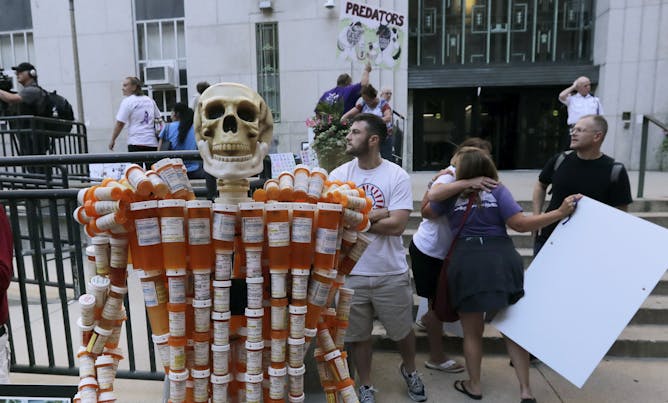|
Two decades into the opioid crisis, following some 400,000 U.S. deaths involving overdoses from prescription and illicit drugs, prospects for accountability are growing brighter. States, counties and cities have filed thousands of lawsuits that are beginning to be settled or go to trial.
As Indiana University Robert H. McKinney School of Law professor Nicolas Paul Terry explains, companies that made, distributed and dispensed addictive prescription painkillers stand accused of flouting a DEA rule issued back in 1971. Known as the Controlled Substances Act, it requires the reporting of any “suspicious orders” to the authorities. Terry describes the missteps from regulators and industry that contributed to the
crisis.
Also today:
|

Protests and lawsuits against opioid manufacturers are growing more common, but drug distributors are also facing scrutiny.
AP Photo/Charles Krupa
Nicolas Paul Terry, IUPUI
Previously secret documents and data make it clear that many companies engaged in the distribution of prescription painkillers either skirted or ignored their legal obligations for years.
|
Science + Technology
|
-
Marco Túlio Pacheco Coelho, Universidade Federal de Goias; Michael Gavin, Colorado State University
Linguists have a lot of largely untested theories. Borrowing a tool from ecology, researchers built a model that didn't look for one worldwide explanation.
-
Maggie Villiger, The Conversation
CRISPR technology could have momentous effects if it's used to edit genes that will be inherited by future generations. Researchers and ethicists continue to weigh appropriate guidelines.
|
|
|
|
|
|
Most read on site
|
-
Darby Saxbe, University of Southern California – Dornsife College of Letters, Arts and Sciences; Jennifer Hahn-Holbrook, University of California, Merced
Breast milk contains ingredients in concentrations that change over the course of the day. Researchers think milk is chrononutrition, carrying molecular messages to help set a baby's internal clock.
-
Christine Helms, University of Richmond
High speeds, the threat of dangerous crashes, the excitement of the crowd – and the laws of physics on full display. A physicist explains the science of NASCAR.
-
Lubna Omar, Binghamton University, State University of New York
Armed conflict in Syria has been a disaster for the area's cultural heritage. A displaced archaeologist describes what's being lost.
|
|
Today’s chart |
-
  |
Nicolas Paul Terry
IUPUI
|
| |